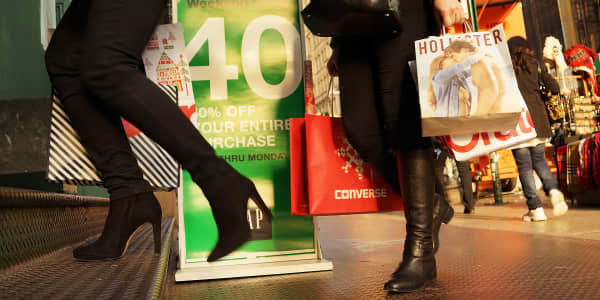It's almost here: the after-Christmas rush to return unwanted gifts.
Most stores try to make it easy for you to get a refund. Many have special holiday policies that give you extra time to bring things back.
(Read more: Grandparents scrimp, but spoil grandkids)
But a few big-name retailers have tightened up the rules this year, according to a survey released Wednesday by ConsumerWorld.org.
"We're finding that more and more stores are dividing up their return policies, so certain types of goods have different rules," said Consumer World founder Edgar Dworsky. "And if any type of merchandise is going to have a stricter policy, it's going to be electronics and appliances. We see relatively short return periods for these things as compared to other items, such as clothing."
Consumer World found abbreviated return periods at three major retail chains:
- Best Buy shortened its holiday return period by nine days (now Jan. 15 instead of Jan. 24). The store had cut its regular return period in half (to 15 from 30 days) for most customers in March. Special orders are no longer refundable.
- Sears shortened its regular return policy for major appliances and vacuums to 30 from 60 days, and excludes them from its extended holiday return period.
- Toys R Us introduced an extended holiday return period for most items, until Jan. 25, but it shortened the return window (to 30 from 45 days) on certain electronics bought on or after Nov, 1. The return deadline for cameras, camcorders, digital audio players, video game hardware, DVD players or no-contract cellphones given as Christmas gifts is Jan. 9.
Consumer World found that most retailers will let you return items bought online to physical stores. That could save you a return shipping charge.
"Sports Authority is one of the few stores that says something bought online cannot be returned to the store. You have to send it back to the dot-com," Dworsky said.
(Read more: Forget jewels—these are gifts she really wants)
Remember, allowing returns is a customer service and not required by law unless the merchandise is defective. In some states, stores are allowed to replace a defective item rather than provide a refund. Some stores have a no-return policy. Others will provide only a store credit. Some notable policies:
- Overstock.com will not take back any TV that's 37 inches or larger.
- Amazon no longer accepts returns on jewelry without all required documentation.
- Office Max will not give refunds on any product that it no longer stocks.
Though restocking fees are declining, some stores still charge them—typically 15 percent—on electronic products when the box is opened and the factory seal has been broken. But there may be a restocking charge on other items.
- Macy's has a 15 percent restocking fee for furniture and mattresses.
- Amazon charges a 50 percent restocking fee on open DVDs and CDs, and 20 percent for late returns.
To provide full credit, most stores require that all returned items, unless they're defective, be in new or like-new condition, with the original packaging and all accessories, and accompanied by all the paperwork.

Retailers want to accommodate legitimate returns but are battling an epidemic of return fraud that will cost them an estimated $8.76 billion, according to the National Retail Federation (NRF).
A significant portion—$3.4 billion—of the loss comes during the holiday season. Based on its 2013 Return Fraud Survey, the NRF estimates that nearly 6 percent of holiday returns this year will be fraudulent, up from 4.6 percent in 2012. The survey also found that throughout the year, 14 percent of returns made without a receipt are fraudulent.
To combat this crime wave, most stores (74 percent) require picture ID if you want to return something without a receipt. Another 12 percent require ID even from customers who have a receipt.
(Read more: Pssst, Santa! This is what kids want this holiday)
It's always been best to bring a receipt when you return or exchange something. That way you'll get the full price paid for it. Without a receipt, you may get the most recent sale price—if the store accepts the return at all.
"It's absolutely reasonable to expect the customer to prove that the item they're trying to return came from that store, when it was purchased and at what price," Dworsky said. "Return fraud costs all of us in the long run."
Consumer World has compiled a detailed list of return policies at more than a dozen major retailers.
—By CNBC contributor Herb Weisbaum. Follow him on Facebook and Twitter @TheConsumerman or visit The ConsumerMan website.





